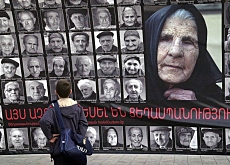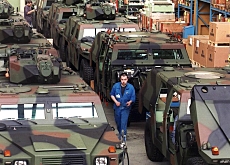Armenian question overshadows Turkish visit

A delegation of Turkish parliamentarians arrives in Switzerland on Monday, amid fresh controversy over the killing of Armenians by the Ottoman Empire.
Newspaper reports in Turkey on Friday said planned visits by ministers from both countries had been cancelled, in response to the launch of a criminal investigation against a Turkish historian.
Turkish newspapers, Radikal and Milliyet, reported that the Turkish trade minister, Kürsad Tüzmen, had cancelled a visit to Zurich, planned for June 22-24.
Tüzmen had been due to address the Swiss-Turkish Business Council, which said he had postponed his visit a month ago. He was also due to meet the economics minister, Joseph Deiss.
Tüzmen was refusing to come to Switzerland for reasons of solidarity with the historian in question, Yusuf Halacoglu, the papers said. Radikal quoted Tüzmen as saying that Halacoglu was a “good friend”.
Last month, the cantonal prosecutor’s office in Winterthur launched a criminal investigation against Halacoglu for violating anti-racism laws. The prosecutor’s office says the Turkish historian played down the massacre of Armenians in 1915-18 in a speech in May 2004.
According to Radikal and Milliyet, Deiss has cancelled a reciprocal visit to Turkey, scheduled for September. There has been no confirmation from the Swiss economics ministry, but spokesman Manuel Sager said the Turkish side had indicated that there were “scheduling problems” with the visit.
However, the press attaché at the Turkish embassy in Bern, Sibel Gal, said Deiss’s visit was still expected to take place in the autumn.
Controversy
The latest controversy comes as the foreign affairs committee of the Turkish Grand National Assembly begins a weeklong visit to Switzerland on Monday. The trip is a reciprocal visit: a Swiss delegation visited Ankara last year.
The Turks are due to meet Swiss parliamentarians, as well as Deiss and the Swiss foreign minister, Micheline Calmy-Rey.
Turkey and Switzerland have been at odds over the Armenian question since 2003, when the Vaud cantonal parliament voted to recognise the killings as genocide. The House of Representatives followed suit three months later.
Ankara withdrew an invitation to Calmy-Rey after the vote in Vaud, but she visited the country last March once tensions had eased.
Turkey strongly denies the charge of genocide, putting the emphasis on killings by both sides.
“Bitter taste”
Speaking to swissinfo earlier in the week, before the latest controversy erupted, the Turkish ambassador to Bern, Alev Kiliç, admitted that the Armenian situation “has left a bitter taste at a certain point in our relations”.
“We would like to clear this once and for all by establishing a commission of historians from both sides and opening all files and archives.”
Kiliç added the Swiss had shown interest in such a commission during Calmy-Rey’s visit in March, and that now it was up to the Armenians to make their position clear.
“Of course the proposal has also been made to the Armenian government and we can’t establish anything without their agreement. We have still not received a positive reply.”
swissinfo
Armenians say between 800,000 and 1.8 million of their people were killed or deported by the Ottoman Empire from 1915-18.
Turkey disputes this, saying there were killings on both sides.
There are 80,000 Turks living in Switzerland and 6,000 people with Armenian roots.
In 2004, Swiss exports to Turkey were worth SFr1.9 billion ($1.5 billion), 17% more than in 2003.
The issue of the Armenian killings has strained relations between Switzerland and Turkey over recent years.
After the visit of Foreign Minister Micheline Calmy-Rey to Turkey at the end of March, both sides spoke of a new chapter in relations.

In compliance with the JTI standards
More: SWI swissinfo.ch certified by the Journalism Trust Initiative












You can find an overview of ongoing debates with our journalists here . Please join us!
If you want to start a conversation about a topic raised in this article or want to report factual errors, email us at english@swissinfo.ch.